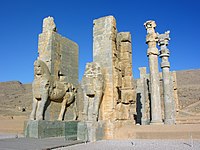卡扎尔王朝
| 此條目没有列出任何参考或来源。 (2012年7月18日) |
| 伊朗崇高國 دولت علیّه ایران Dowlat-e Elliye-ye Irân | |||||||||||||||
|---|---|---|---|---|---|---|---|---|---|---|---|---|---|---|---|
| 1785年—1925年 | |||||||||||||||
| 地位 | 王朝 | ||||||||||||||
| 首都 | 德黑蘭 | ||||||||||||||
| 常用语言 | 波斯語 (宫廷文学、行政、文化、官员),[1][2] 突厥語 (宫廷语与母语)[3] | ||||||||||||||
| 政府 | 君主專制 (1785–1906) 君主立憲制 (1906–1925) | ||||||||||||||
| 沙阿、殿下 | |||||||||||||||
• 1794–1797 | 阿迦·穆罕默德·汗 (首任) | ||||||||||||||
• 1909–1925 | 艾哈邁德·沙 (末任) | ||||||||||||||
| 伊朗首相 | |||||||||||||||
• 1906年 | Mirza Nasrullah Khan (first) | ||||||||||||||
• 1923年–1925年 | 礼萨·巴列维 (last) | ||||||||||||||
| 历史 | |||||||||||||||
• 卡扎爾王朝開始 | 1785年 | ||||||||||||||
• 古利斯坦条约 | 1813年 | ||||||||||||||
• 土库曼恰伊条约 | 1828年 | ||||||||||||||
• 波斯立憲革命 | 1906年 | ||||||||||||||
• 巴勒維王朝開始 | 1925年 | ||||||||||||||
| 货币 | Toman | ||||||||||||||
| |||||||||||||||
| 今属于 | |||||||||||||||
历史系列条目 |
|---|
| 伊朗历史 |
 |
|
年代历史 |
卡扎尔王朝(Qājār dynasty,1794年—1925年),也译作恺加王朝。伊朗北部卡扎尔部落(現代屬於土庫曼人)首领阿迦·穆罕默德·汗建立的王朝。
歷史
阿迦·穆罕默德·汗早年曾在桑德王朝(1750年~1794年)统治者卡里姆汗宫廷中作人质。
1779年卡里姆汗死,阿迦·穆罕默德逃往北方根据地,并乘桑德王朝后裔争夺王位互相残杀之机扩张势力。1794年他攻破克尔曼,遂统治伊朗各主要省份。1796年加冕为伊朗国王,建都德黑兰。同年征服呼罗珊。
阿迦·穆罕默德去世后,经历了6个国王:
- 法塔赫·阿里沙 (1797年-1834年)
- 穆罕默德·沙 (1834年-1848年)
- 納賽爾丁·沙 (1848年-1896年)
- 穆扎法尔丁·沙 (1896年-1907年)
- 穆罕默德·阿里·沙 (1907年-1909年)
- 艾哈迈德·沙 (1909年-1925年)
在法塔赫·阿里沙在位期间,伊朗于1804年~1813年和1826年~1828年两次同俄羅斯帝国发生战争,伊朗战败,失去大片土地。1848年~1852年发生巴布教徒起义。1856年~1857年的英国-波斯战争中,伊朗被迫永远放弃赫拉特(位于今阿富汗境内)。1905年~1911年发生了波斯立宪革命,穆罕默德·阿里·沙国王被迫召集伊朗议会,制定了伊朗第一部宪法。
1921年2月,哥萨克师军官礼萨·汗发动政变,夺取政权,自任陆军大臣,又于1923年取得伊朗首相职位。1925年10月,伊朗议会废黜国王艾哈迈德·沙,12月宣布礼萨·汗为国王,开创巴列维王朝。
参考文献
- ^ Homa Katouzian, "State and Society in Iran: The Eclipse of the Qajars and the Emergence of the Pahlavis", Published by I.B.Tauris, 2006. pg 327: "In post-Islamic times, the mother-tongue of Iran's rulers was often Turkic, but Persian was almost invariably the cultural and administrative language"
- ^ Homa Katouzian, "Iranian history and politics", Published by Routledge, 2003. pg 128: "Indeed, since the formation of the Ghaznavids state in the tenth century until the fall of Qajars at the beginning of the twentieth century, most parts of the Iranian cultural regions were ruled by Turkic-speaking dynasties most of the time. At the same time, the official language was Persian, the court literature was in Persian, and most of the chancellors, ministers, and mandarins were Persian speakers of the highest learning and ability"
- ^ http://www.iranicaonline.org/articles/turkic-iranian-contacts-i-linguistic: "Turkic was also the mother tongue and, to an extent, the court language of the subsequent Afsharid and Qajar dynasties"
| |||||||||
| ||||||||||||


